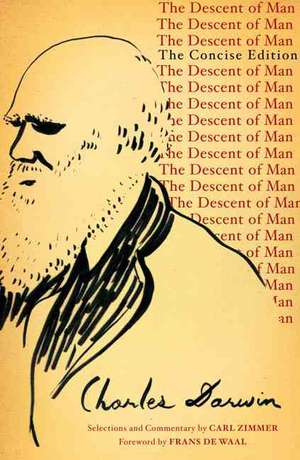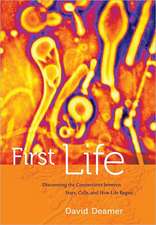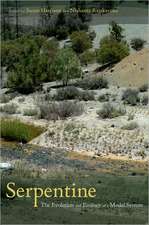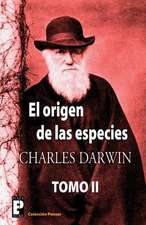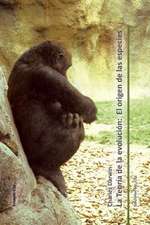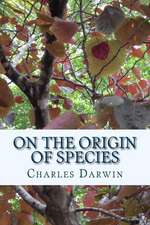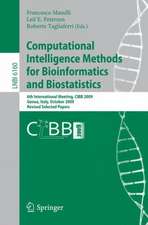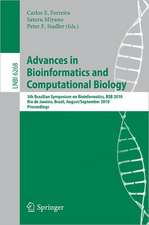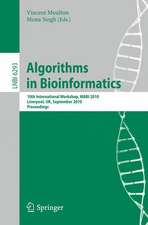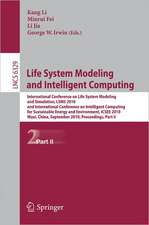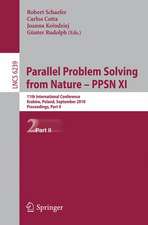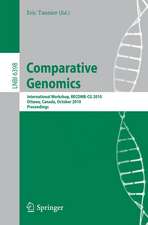The Descent of Man
Autor Charles Darwin Frans de Waal Editat de Carl Zimmeren Limba Engleză Paperback – 30 noi 2007
The most accessible edition ever published of Darwin?s incendiary classic, edited by ?as fine a science essayist as we have? (New York Times)
The Descent of Man, Darwin?s second landmark work on evolutionary theory (following The Origin of the Species), marked a turning point in the history of science with its modern vision of human nature as the product of evolution. Darwin argued that the noblest features of humans, such as language and morality, were the result of the same natural processes that produced iris petals and scorpion tails.
To convey the revolutionary importance of this groundbreaking book, renowned evolutionary science writer Carl Zimmer edited this special abridged edition?made up of nine excerpts, each one representing one of Darwin?s major themes?and wrote illuminating introductions to each section, as well as an overall introduction. Zimmer brilliantly places Darwin?s basic ideas in the context of the current understanding of human nature and twenty-first-century DNA research. By accessibly presenting Darwin?s thinking to a modern readership, Zimmer eloquently demonstrates Darwin?s ever-increasing relevance and amazing scientific insight.
The Descent of Man, Darwin?s second landmark work on evolutionary theory (following The Origin of the Species), marked a turning point in the history of science with its modern vision of human nature as the product of evolution. Darwin argued that the noblest features of humans, such as language and morality, were the result of the same natural processes that produced iris petals and scorpion tails.
To convey the revolutionary importance of this groundbreaking book, renowned evolutionary science writer Carl Zimmer edited this special abridged edition?made up of nine excerpts, each one representing one of Darwin?s major themes?and wrote illuminating introductions to each section, as well as an overall introduction. Zimmer brilliantly places Darwin?s basic ideas in the context of the current understanding of human nature and twenty-first-century DNA research. By accessibly presenting Darwin?s thinking to a modern readership, Zimmer eloquently demonstrates Darwin?s ever-increasing relevance and amazing scientific insight.
| Toate formatele și edițiile | Preț | Express |
|---|---|---|
| Paperback (10) | 35.52 lei 3-5 săpt. | +18.37 lei 7-13 zile |
| WORDSWORTH EDITIONS LTD – 8 iul 2013 | 35.52 lei 3-5 săpt. | +18.37 lei 7-13 zile |
| CreateSpace Independent Publishing Platform – | 111.20 lei 3-5 săpt. | |
| Plume Books – 30 noi 2007 | 138.12 lei 3-5 săpt. | |
| CREATESPACE – | 176.49 lei 3-5 săpt. | |
| – | 181.36 lei 3-5 săpt. | |
| – | 210.87 lei 3-5 săpt. | |
| Outlook Verlag – 24 sep 2019 | 474.65 lei 3-5 săpt. | |
| Digireads.com – 9 iun 2019 | 164.56 lei 6-8 săpt. | |
| NuVision Publications – 29 sep 2007 | 269.17 lei 39-44 zile | |
| Delhi Open Books – 12 iun 2020 | 273.18 lei 6-8 săpt. | |
| Hardback (1) | 588.51 lei 3-5 săpt. | |
| Outlook Verlag – 24 sep 2019 | 588.51 lei 3-5 săpt. |
Preț: 138.12 lei
Nou
Puncte Express: 207
Preț estimativ în valută:
26.43€ • 27.56$ • 21.97£
26.43€ • 27.56$ • 21.97£
Carte disponibilă
Livrare economică 27 februarie-13 martie
Preluare comenzi: 021 569.72.76
Specificații
ISBN-13: 9780452288881
ISBN-10: 0452288886
Pagini: 448
Dimensiuni: 151 x 200 x 24 mm
Greutate: 0.37 kg
Ediția:Prescurtată
Editura: Plume Books
ISBN-10: 0452288886
Pagini: 448
Dimensiuni: 151 x 200 x 24 mm
Greutate: 0.37 kg
Ediția:Prescurtată
Editura: Plume Books
Descriere
In this accessible edition of Darwins incendiary classic, renowned evolutionary science writer Zimmer edits this special abridged edition--made up of nine excerpts--and brilliantly places Darwins basic ideas in the context of the current understanding of human nature and 21st-century DNA research.
Notă biografică
Charles Darwin, a Victorian scientist and naturalist, has become one of the most famous figures of science to date. Born in 1809 to an upper-middle-class medical family, he was destined for a career in either medicine or the Anglican Church. However, he never completed his medical education and his future changed entirely in 1831 when he joined HMS Beagle as a self-financing, independent naturalist. On returning to England in 1836 he began to write up his theories and observations which culminated in a series of books, most famously On the Origin of Species by Means of Natural Selection in 1859, where he challenged and contradicted contemporary biological and religious beliefs with two decades worth of scientific investigation and theory. Darwin's theory of natural selection is now the most widely accepted scientific model of how species evolve. He died in 1882 and was buried in Westminster Abbey.
Damien Hirst is an internationally renowned English artist, who has dominated the art scene in England since the 1990s. Known in particular for his series of works on death, Hirst here provides a contemporary, visual take on Darwin's theory of evolution - the struggle between life and death in nature.
William Bynum is Professor Emeritus of the History of Medicine at University College, London, and was for many years Head of the Academic Unit of the Wellcome Institute for the History of Medicine. He edited the scholarly journal Medical History from 1980 to 2001, and his previous publications include Science and the Practice of Medicine in the Nineteenth Century; The Companion Encyclopedia of the History of Medicine (co-edited with Roy Porter); The Oxford Dictionary of Scientific Quotations (with Roy Porter), The Dictionary of Medical Biography (with Helen Bynum), and History of Medicine: A Very Short Introduction. He lives in Suffolk.
Damien Hirst is an internationally renowned English artist, who has dominated the art scene in England since the 1990s. Known in particular for his series of works on death, Hirst here provides a contemporary, visual take on Darwin's theory of evolution - the struggle between life and death in nature.
William Bynum is Professor Emeritus of the History of Medicine at University College, London, and was for many years Head of the Academic Unit of the Wellcome Institute for the History of Medicine. He edited the scholarly journal Medical History from 1980 to 2001, and his previous publications include Science and the Practice of Medicine in the Nineteenth Century; The Companion Encyclopedia of the History of Medicine (co-edited with Roy Porter); The Oxford Dictionary of Scientific Quotations (with Roy Porter), The Dictionary of Medical Biography (with Helen Bynum), and History of Medicine: A Very Short Introduction. He lives in Suffolk.
